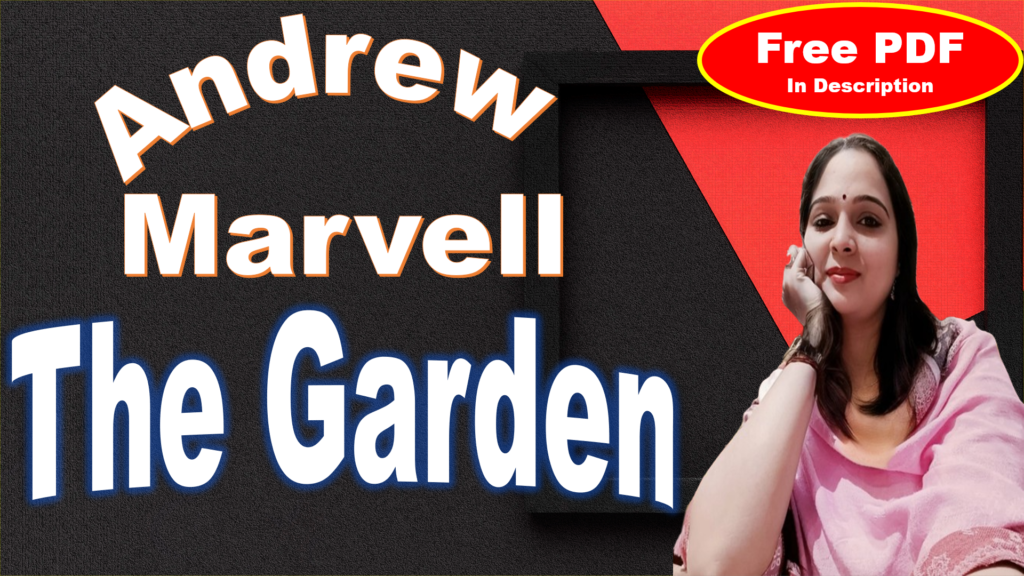
Essay Type Questions
1. Write the critical appreciation of the poem “The Garden” by Andrew Marvell.
Introduction Andrew Marvell is a renowned English poet known for his metaphysical poetry and satirical works. “The Garden” is one of his most famous poems, which presents a stark contrast between the hustle and bustle of human life and the serene beauty of nature. The poem invites readers to appreciate the tranquility and peace found in nature and solitude.
Structure, Form, and Rhyme Scheme “The Garden” is structured into nine octaves, or eight-line stanzas. This structure provides a rhythmic flow to the poem and enhances the musicality of Marvell’s words. The poem follows a regular rhyme scheme of AABBCCDD. This means that the first- and second-lines rhyme, the third- and fourth-lines rhyme, and so on. This consistent rhyme scheme adds to the poem’s overall cohesion and contributes to its aesthetic appeal.
Plot The plot of the poem revolves around the speaker’s experience in a garden. The speaker finds tranquility and contentment in the garden, away from the hustle and bustle of society. The speaker contemplates the beauty of nature, enjoys the simple pleasures of life, and reflects on the power of the mind. The garden serves as a sanctuary for the speaker, offering a respite from the demands and pressures of society.
Themes
Natural Beauty One of the most prominent themes in “The Garden” is the appreciation of natural beauty. The speaker finds solace and tranquility in the garden, away from the hustle and bustle of society. The vivid and detailed imagery used by Marvell brings the garden to life, creating a sensory experience for the reader. The ripe fruits, beautiful trees, and flowers are all celebrated for their inherent beauty.
Solitude and Contemplation The theme of solitude and contemplation is central to the poem. The speaker suggests that true happiness and contentment can be found in solitude, away from the demands and pressures of society. The garden serves as a sanctuary for the speaker, offering a space for reflection and contemplation. The speaker finds peace in the quiet and repose offered by the garden.
The Power of the Mind The power of the mind and the capacity for imagination is another key theme in the poem. The speaker suggests that the mind has the power to create its own realities, transcending the physical world. The mind is compared to an ocean, where each kind finds its own resemblance, yet it creates, transcending these, far other worlds, and other seas.
The Futility of Worldly Pursuits The poem also explores the theme of the futility of worldly pursuits. The speaker criticizes those who spend their time in feverish endeavours to win honours in different fields of life. He suggests that these pursuits are futile compared to the peace and fulfilment that can be found in nature and in one’s own mind.
The Passage of Time The passage of time is another theme that is subtly woven into the poem. The speaker reflects on the transient nature of life and the fleeting beauty and pleasure that we often strive to attain. The journey of the sun and the work of the bee are used as symbols to represent the passage of time.
Poetic Devices
Imagery One of the most striking features of “The Garden” is its vivid and detailed imagery. Marvell brings the garden to life with descriptions of ripe fruits, beautiful trees, and flowers. These images create a sensory experience for the reader, making the garden seem almost tangible.
Metaphor Marvell uses metaphors throughout the poem to compare the garden to a state of mind that is at peace and in harmony with nature. The garden serves as a sanctuary for the speaker, offering a space for reflection and contemplation. The mind is also compared to an ocean, suggesting its vastness and depth.
Personification
Fair Quiet and Innocence: In the second stanza, Marvell personifies ‘Fair Quiet’ and ‘Innocence’. He speaks to them as if they were human beings, saying that he has found them in the garden, away from the company of men.
Society: Society is also personified in the poem. The speaker suggests that ‘Society is all but rude, To this delicious solitude’, attributing human characteristics to society.
Trees: The trees in the garden are personified as well. The speaker says, ‘Fair trees! wheresoever your barks I wound, No name shall but your own be found’, suggesting that the trees have their own identities.
Allusion Marvell makes use of allusions in the poem, referring to mythological stories of Apollo and Daphne, and Pan and Syrinx14. These allusions add a layer of depth to the poem and enrich its thematic content
Message The message of the poem is that true happiness and contentment can be found in nature and in one’s own mind. The poem suggests that the pursuit of worldly honours and pleasures is futile compared to the peace and fulfilment that can be found in solitude and contemplation. The speaker encourages readers to seek peace and contentment within themselves and to appreciate the beauty of the natural world.
Conclusion In conclusion, “The Garden” by Andrew Marvell is a profound meditation on nature, solitude, the power of the mind, and the passage of time. The poem’s rich imagery, metaphysical conceits, and rhythmic flow make it a captivating read, offering deep insights into the human condition and our relationship with nature. The poem invites us to appreciate the beauty of the natural world and to seek peace and contentment within ourselves.





